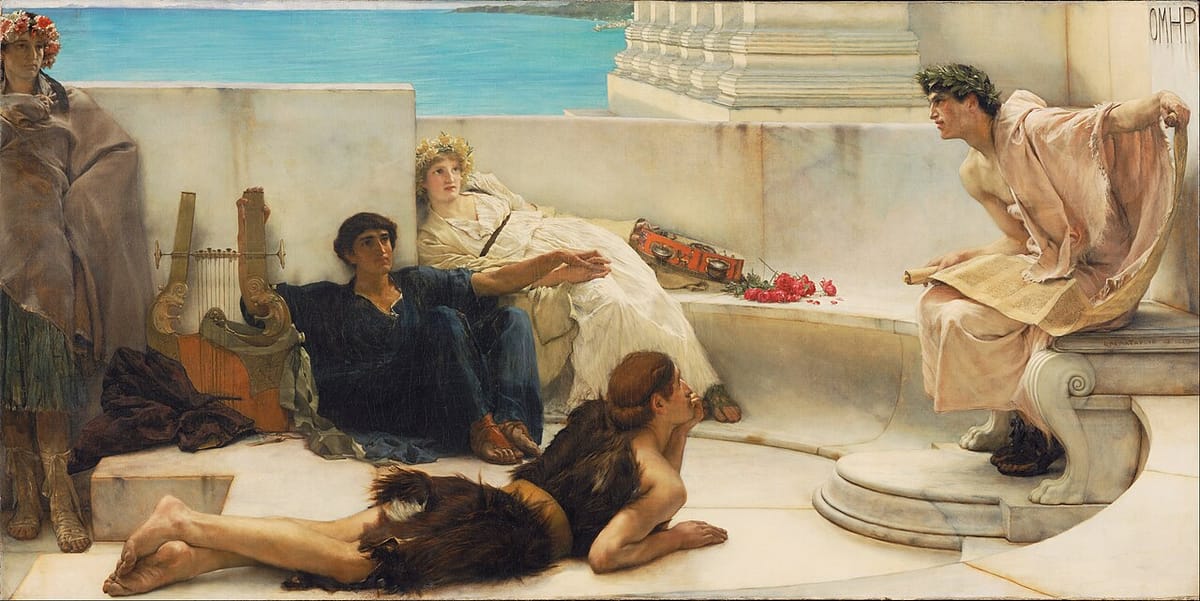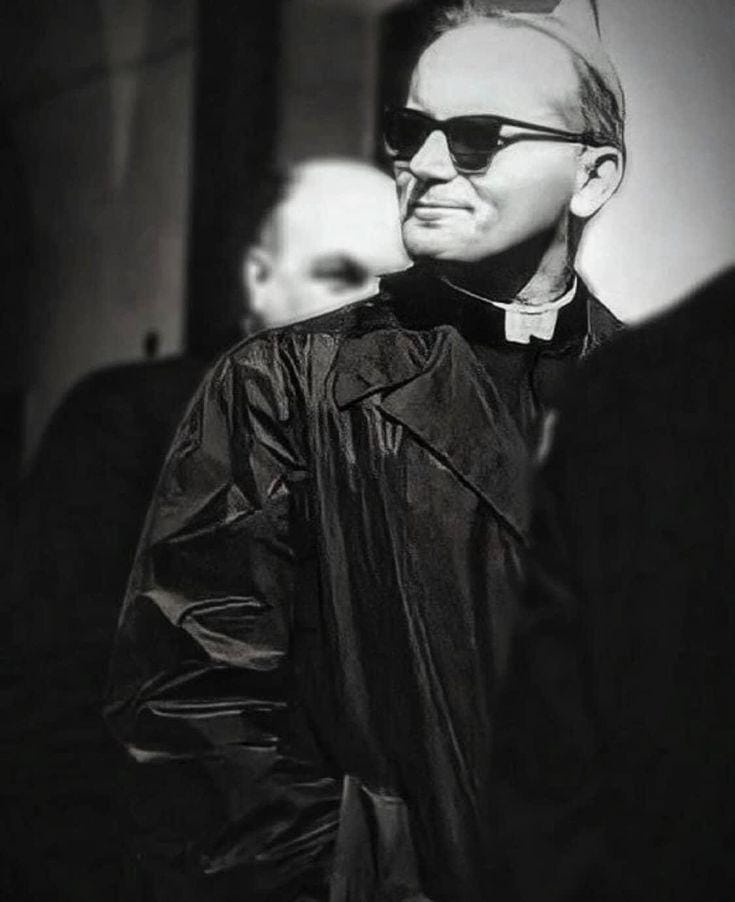Liberty Poets’ Nook

Poets’ Nook is a space within CDMag dedicated to the voices that have carried freedom, conscience, and human dignity through the storms of the 20th century. These are not poems of ornament, but of witness—written in prison cells, on battlefields, in exile, or under censorship.
Here you will find Anna Akhmatova’s Requiem, Osip Mandelstam’s whispered satire of Stalin, Paul Celan’s Death Fugue, Wisława Szymborska’s ironic labors of aftermath, Karol Wojtyła’s meditations from quarry and chapel, and many others.
Each poem is presented with context and reflection, to show why it matters today. Poets’ Nook is less an anthology than a meeting place: a reminder that liberty begins in words spoken against silence, and that the conscience of one can sustain the hope of many.
Paul Éluard (France, 1895–1952) – Liberté
Written in 1942 under Nazi occupation, Liberté was parachuted over occupied France by the Royal Air Force. Its 21 stanzas, each ending with the refrain “I write your name”, became a clandestine anthem of hope.
Excerpt:
“On my notebooks of schoolboy
On my desk and the trees
On the sand on the snow
I write your name.
On every page read
On all the white pages
Stone blood paper or ash
I write your name.
On the windows of surprises
On the lips that are attentive
Far above the silence
I write your name.
And by the power of a word
I begin my life again
I was born to know you
To name you:
Freedom.”
Why it matters: The poem transforms liberty into a litany, sanctifying it by repetition. Its power lies not in argument but incantation: liberty is written everywhere, for everyone, against erasure. In wartime France, it gave ordinary people a language of defiance that neither censorship nor fear could suppress. Its legacy endures as proof that poetry can itself be an act of resistance.
Anna Akhmatova (Russia, 1889–1966) – Requiem
Refusing exile, Akhmatova remained in Leningrad during the Great Terror, standing in the prison queues with other women as they waited for news of their sons and husbands—including her own. From that solidarity came Requiem, a sequence memorized by friends and only published decades later.
Excerpt:
“No, not under an alien sky,
not under the shelter of alien wings—
I was with my people then,
where my people, alas, were.
And I pray not for myself alone,
but for all those who stood with me,
under that blind red wall,
in the cruel cold of Leningrad.”
Why it matters: Requiem transforms private grief into collective witness. Akhmatova chose presence over safety, voicing the suffering that millions were forced to silence. Her poem demonstrates that fidelity—to people, to memory, to truth—is itself a form of freedom.
Osip Mandelstam (Russia, 1891–1938) – Epigram on Stalin
Mandelstam’s whispered lines about Stalin, recited only to trusted friends, sealed his fate. Arrested and exiled, he died in a transit camp. His satire, spare and direct, remains one of the most dangerous poems ever spoken.
Excerpt:
“We live, not feeling the country beneath us,
our speech inaudible ten steps away,
yet wherever there’s half a conversation,
the Kremlin’s mountaineer will be mentioned.
His thick fingers are fat as worms,
his words are solid as lead weights,
his cockroach moustaches laugh,
and the tops of his boots gleam.”
Why it matters: The poem exposes the suffocating climate of fear and the grotesque cult of personality that defined Stalin’s rule. Mandelstam shows that the first act of freedom is to speak reality aloud, even when it carries a death sentence. His defiance embodies conscience in its most uncompromising form.
Paul Celan (Romania/Germany, 1920–1970) – Death Fugue
A survivor of the Holocaust, Celan forged a new poetic idiom to carry atrocity. Death Fugue combines the musical cadence of a fugue with the horrors of extermination camps, making beauty itself into a vessel of grief and memory.
Excerpt:
“Black milk of dawn we drink it at night,
we drink it at noon and in the morning, we drink it at evening,
we drink and we drink.
We shovel a grave in the sky where you won’t lie too cramped.
A man lives in the house, he plays with his vipers,
he writes when it grows dark to Germany, your golden hair Margarete.
Your ashen hair Shulamith,
we dig a grave in the sky where you won’t lie too cramped.”
Why it matters: Celan turns language into memorial, rhythm into lament. The repetition enacts the inescapability of horror, refusing to let the victims vanish into silence. His poem reminds us that freedom is not only the absence of chains but the obligation to remember and to mourn.
Wisława Szymborska (Poland, 1923–2012) – The End and the Beginning
Szymborska, Nobel laureate and master of irony, often looked at history through its overlooked corners. In The End and the Beginning she dismantles the heroic myth of war, turning instead to the unglamorous labor that follows destruction.
Excerpt:
“After every war someone has to clean up.
Things won’t straighten themselves up, after all.
Someone has to push the rubble to the side of the road,
so the carts loaded with corpses can get by.
Someone has to get mired in scum and ashes,
sofa springs, splintered glass, and bloody rags.
Someone must drag in a girder to prop up a wall,
someone must glaze a window, rehang a door.
Photogenic it’s not, and takes years.
All the cameras have gone to another war.”
Why it matters: Szymborska unmasks the hidden face of freedom: it is not achieved once for all, but constantly rebuilt by hands that never make headlines. Conscience here is not grand rhetoric but patience, perseverance, and attention to detail. She reminds us that societies endure not because of monuments, but because ordinary people pick up the debris and begin again.
Zbigniew Herbert (Poland, 1924–1998) – The Power of Taste
Herbert, a moral dissident under communism, cultivated an ethic of ironic restraint. He believed survival did not always require heroism, but sometimes something as small and unfashionable as good taste.
Excerpt:
“It did not require great character at all,
we had only a bit of taste.
Yes, taste,
which tells you quickly when a man takes off his shoes of honor,
and walks barefoot into shame.
It did not require much—
only a sharp sense of smell,
a sense of touch,
to distinguish dung from roses.
We had only a bit of taste,
yet it saved us.”
Why it matters: Herbert refuses to romanticize resistance. He insists that conscience can be exercised in subtle judgments—refusing kitsch, rejecting lies, maintaining dignity. This poem matters because it shows how even in the suffocating grip of ideology, ordinary discernment could keep one’s humanity intact. Resistance begins with refusing to call ugliness beauty, or slavery freedom.
Vasko Popa (Serbia, 1922–1991) – Little Box
Popa, a pioneer of modern Serbian poetry, wrote in parables and surreal fables that slipped past censors yet carried sharp political meaning. Little Box is one of his most famous allegories of conformity.
Excerpt:
“The little box grows,
grows and grows,
till it grows bigger than the whole world.
The little box remembers its childhood,
and doesn’t want to stay small.
The little box swallows bells,
swallows birds,
swallows people,
swallows cities,
and in the end swallows everything.”
Why it matters: Popa captures how systems—bureaucracy, ideology, unchecked authority—expand until nothing is left outside them. Freedom disappears not only through violence but through this quiet absorption, where one structure becomes the measure of all life. His parable warns that vigilance is required: once the box grows too large, there is no world beyond it.
There's more!
Fernando Pessoa (Portugal, 1888–1935) – Message (Mensagem, 1934)
Though Portugal was under Salazar’s dictatorship, Pessoa’s Mensagem is less political propaganda than a meditation on destiny, discovery, and the multiplicity of identity. Writing through his “heteronyms”—the distinct poetic selves he invented—Pessoa embodied inner pluralism long before the term was common.
Excerpt:
*“The sea discovered is never the sea complete;
it is the opening to other seas.
God gave the sea danger and the abyss,
but in it He mirrored heaven.”*
Why it matters: Pessoa transforms Portugal’s maritime past into a metaphor for inner and cultural freedom: discovery as endless, identity as inexhaustible. His very method—the use of multiple poetic personas—demonstrates that one conscience can hold many voices without collapsing into uniformity. Freedom, in Pessoa’s vision, is an openness to the unknown, a refusal to treat any sea as final.
Karol Wojtyła (Poland, 1920–2005) – Poet of Conscience and Freedom
Before he became Pope John Paul II, Karol Wojtyła was a poet and playwright whose writings wrestled with the central themes of freedom, dignity, and responsibility. Shaped by Nazi occupation, forced labor, and life under communism, his poetry combines philosophical depth with spiritual intensity. Three works, taken together, illuminate his vision of liberty:

1. The Place Within
A meditation on interior freedom and the sacredness of conscience.
“There is a place within me
that no one else possesses.
There I meet You,
and from that meeting,
I am sent back to others.”
Here, Wojtyła describes the inviolability of the person. Freedom is grounded in conscience, which cannot be taken away by force. From this inner sanctuary, the individual is called outward in service to others.
2. The Quarry
Written in memory of his time as a forced laborer in a stone quarry during the Second World War.
*“The breaking of stone,
this daily labor,
weighs down the body,
yet from within
a light persists.
Hands blister,
muscles ache,
but man remains more than stone,
more than tool,
for within him lives
the quarry of the spirit.”*
Here freedom is revealed in dignity: even under oppression and exhaustion, man cannot be reduced to a tool. Conscience transforms labor into participation in creation.
3. Easter Vigil (1966)
A national and spiritual meditation, written during the millennium of Poland’s baptism.
“Each human life is a thin, trembling voice
called to echo the great centuries—
and through it God’s covenant is renewed.
We bear freedom not as prize,
but as fragile torch,
entrusted to us for vigilance.”
Here liberty is seen not as entitlement but as a trust. Freedom must be handed down, protected across generations. Each life participates in this covenant of vigilance.
Why it matters:
Wojtyła’s poetry presents a triptych of freedom: inward (The Place Within), embodied (The Quarry), and communal (Easter Vigil). In every register, liberty is tied to conscience: a sacred interior meeting place, a dignity that cannot be crushed by toil, a responsibility shared across centuries. His words anticipate his papal witness: freedom without truth is fragile, but freedom lived as fidelity to conscience can withstand the weight of history.
